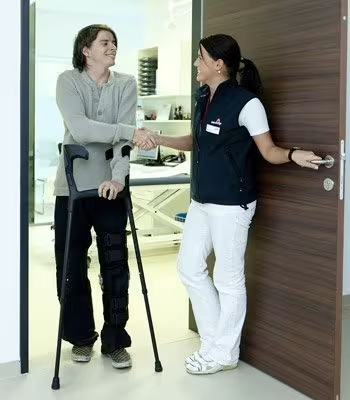10 Things You Might Not Know about Working in the Healthcare Field
Each blog post is dated and contains accurate information as of that date. Certain information may have changed since the blog post’s publication date. If you would like to confirm the current accuracy of blog information, please visit our online OTA overview page or contact admissions at (877) 233-2677.
A desire for working in the healthcare field is extremely admirable. However, this line of work is not for everyone.
Before you jump into the healthcare industry, do your research so you can make an informed decision. Here are 10 things you might not know about working in the healthcare field.

Job Growth
According to the Bureau of Labor Statistics (BLS), the healthcare field will grow much faster than the average for other industries between 2019 and 2029. In this 10-year span, the BLS is predicting a total growth of 15 percent. This translates into 2.4 million new jobs in the healthcare field by 2029. However, not every healthcare career is expected to grow as much or as quickly. Some areas are growing faster than others.
These are the top five fastest growing healthcare occupations:
- Nurse practitioners (52%)
- Occupational Therapy Assistants (35% growth)
- Home Health Aides (34% growth)
- Physical Therapist Assistants (33% growth)
- Physician Assistants (31% growth)
Don’t Always Need a Bachelor’s Degree
While there are healthcare fields that do require a bachelor’s degree, or at least prefer one, it is not necessary for every medical career. There is a handful of jobs where an associate’s degree is sufficient. And these jobs are in just as much demand as those asking for a bachelor’s or master’s degree.
For example, physical therapy assistants, medical assistants, and occupational therapy assistants need an associate’s degree to enter the field.
Flexible Working Hours

While those who go into business or criminal justice tend to have traditional 8-5 style jobs, those in the healthcare field have much more flexibility with their careers. It is true that not every medical career works this way, however, you will have more of a possibility to get flexible working hours in healthcare over any other field.
For example, occupational therapy assistants’ schedule must revolve around what, or when, works for their patients. Occupational therapy is also one of the unique healthcare fields that allow you to work part-time or full-time, giving you even more flexibility.
Patient Diversity
At some point, everyone needs medical care. Whether you are tall or short, older or younger, male or female, etc, you will be considered someone’s patient at some point. What does this mean for caregivers?
It means that as you work with patients, you will be exposed to different cultures, different personalities, and different needs just about every day. As a healthcare professional, you will be exposed to a lot of diversity among your patients.
Workplace Variety
Just as patients will give you diversity in your place of work, there can be a lot of variety in your workplace as a healthcare professional. For example, certified occupational therapy assistants (COTA) can work in a hospital, the school system, a rehabilitation center, an outpatient clinic, a nursing home, or an office building, to name a few. There are several COTA career options available for those looking for a healthcare field with variety.
Not an Easy Field
Healthcare is not an easy field. You must be willing to work hard every day because your patients’ live are counting on it. Working as a healthcare professional should not be taken lightly. You can’t be squeamish when someone else’s life is depending on your head being calm, cool, and collected. Patience has to be a main virtue when working in healthcare.
For example, as an occupational therapy assistant, you would possibly be helping those who suffered a stroke or have a permanent disability. These situations present complex problems that you will help your patients’ work through, but it won’t be overnight. This is why OTAs need patience.
Healthcare is also always changing with new technology and methods. So as a healthcare professional, it is your responsibility to keep up with new information, long after you have graduated. Continuing education is often a requirement for many healthcare fields, including occupational therapy assistants.
Respected by the Community

As a healthcare professional, you will soon find out just how much those around you respect you. In your line of work, you will be presented with situations that many could not handle. (See the part above about not being squeamish.) And you’ll be making a difference in other people’s lives. Who wouldn’t respect that?
You’ll become a go-to anytime a friend or family member needs medical advice. It’s not always applicable to your specialty, as our guest OT blogger points out in Occupational Therapy: Skills for the Job of Living. However because you are in the industry, you have insights that are valuable to friends and family.
Can’t Talk About It
The first rule of healthcare is like the first rule of Fight Club, you can’t talk about it. The Health Insurance Portability and Accountability Act of 1996 (aka HIPAA) requires healthcare professionals to be discreet about their patients. As much as you may like to go home and tell your loved one about your patients, you are ethically bound to keep detailed information to yourself.
HIPAA protects any information that would personally identify your patients, where electronic, paper, or oral. And violating HIPAA compliance is a serious offense. This is why it is important to know and understand the HIPAA privacy rule if you are considering the healthcare field.
Teamwork is Necessary
It really does take a village. Healthcare professionals must work together with their peers and/or supervisors to provide the best care for their patients. The best, more efficient treatment plans are created through collaboration. When working as a team, healthcare professionals tend to make fewer mistakes, have more patients who are satisfied with their care and are more responsive if issues arise and treatment plans need to be altered.
OTA is a Great Healthcare Field
Occupational therapy assistant is a great career choice for anyone interested in going into the healthcare field. It is a healthcare job in demand that gives professionals a variety of workplace options, a diverse patient base, and flexible working hours. And for being in the healthcare industry, it is considered to be one the least stressful healthcare careers available.
There are a lot of interesting facts about occupational therapy you probably don’t know. It’s not a very widely known field. If you’re considering working in healthcare, it should be on your list of careers to explore.
St. Catherine University offers an online OTA program that could have you graduating with an associate’s degree in just 16 months. You can take classes online, giving you a flexible study schedule, and have hands-on fieldwork experience through St. Catherine’s partnership with Genesis Rehab Services in Virginia.
If you’re interested in learning more about how you can get started working in the healthcare field as an occupational therapy assistant, contact us today.


